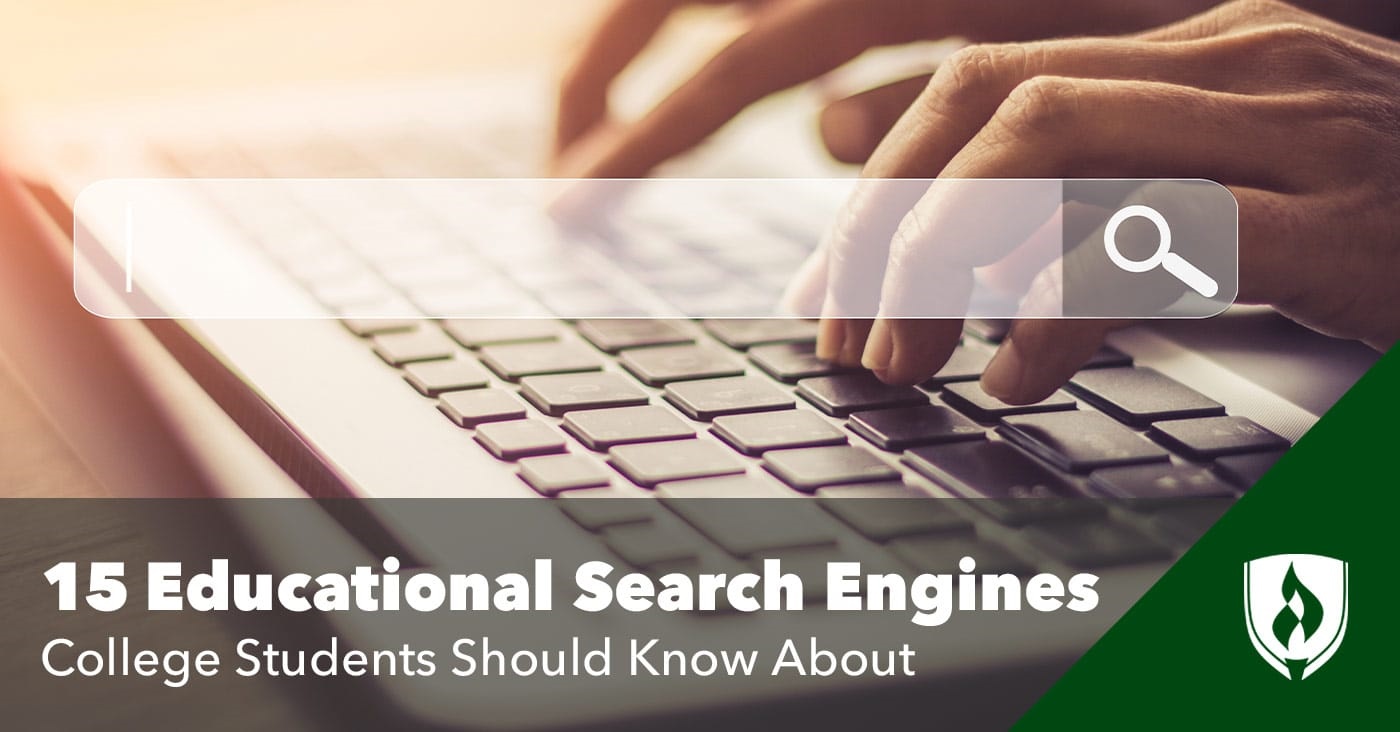
After hours spent scrolling through Google and pulling up endless clickbait results, you’re frustrated with the internet. You have a paper to write, homework to do and things to learn—and this degree isn’t going to earn itself. You know you won’t get away with citing Wikipedia or Buzzfeed in your research paper. Even the big news engines aren’t scholarly enough. You need reputable sources for your homework, and you need them now.
With so many resources online, it’s hard to narrow it down and find ones that are not only reliable and useful, but also free for students. We’ve saved you the time and picked out our 15 best free search engines for research.
15 Scholarly search engines every student should bookmark
1. Google Scholar
Google Scholar was created as a tool to congregate scholarly literature on the web. From one place, students have the ability to hunt for peer-reviewed papers, theses, books, abstracts and articles from academic publishers, professional societies, preprint repositories, universities and other scholarly organizations.
2. Google Books
Google Books allows web users to browse an index of thousands of books, from popular titles to old, to find pages that include your search terms. Once you find the book you are looking for, you can look through pages, find online reviews and learn where you can get a hard copy.
3. Microsoft Academic
Operated by the company that brings you Word, PowerPoint and Excel, Microsoft Academic is a reliable, comprehensive research tool. The search engine pulls content from over 120 million publications, including scientific papers, conferences and journals. You can search directly by topic, or you can search by an extensive list of fields of study. For example, if you’re interested in computer science, you can filter through topics such as artificial intelligence, computer security, data science, programming languages and more.
4. WorldWideScience
WorldWideScience, which refers to itself as “The Global Science Gateway,” is operated by the Office of Scientific and Technical Information—a branch of the Office of Science within the U.S. Department of Energy. The site utilizes databases from over 70 countries. When users type a query, it hits databases from all over the world and will display both English and translated results from related journals and academic resources.
5. Science.gov
Science.gov is operated and maintained by the Office of Science and Technical Information, the same department that collaborates on WorldWideScience.org. This search engine pulls from over 60 databases, over 2,200 websites and 200 million pages of journals, documents and scientific data. Search results can be filtered by author, date, topic and format (text or multimedia).
6. Wolfram Alpha
A self-described “computational knowledge engine,” Wolfram Alpha does not so much provide search results as it does search answers. Simply type in a topic or question you may be interested in, such as, “What is the function of the pancreas?” and the answer will show up without making you scroll through pages of results. This is especially handy for those in need of math help.
7. Refseek
With its minimalist design, Refseek doesn’t look like much. However, the engine pulls from over one billion web pages, encyclopedias, journals and books. It is similar to Google in its functionality, except that it focuses more on scientific and academic results—meaning more results will come from .edu or .org sites, as well as online encyclopedias. It also has an option to search documents directly—providing easy access to PDFs of academic papers.
8. Educational Resources Information Center
Populated by the U.S. Department of Education, the Educational Resources Information Center (ERIC) is a great tool for academic research with more than 1.3 million bibliographic records of articles and online materials. ERIC provides access to an extensive body of education-related literature including journal articles, books, research syntheses, conference papers, technical reports, policy papers and more. With more than eight million searches each month, it’s no wonder why this search engine is a great web source for education.
9. Virtual Learning Resources Center
The Virtual Learning Resources Center (VLRC) is an online index hosting thousands of scholarly websites, all of which are selected by teachers and librarians from around the globe. The site provides students and teachers with current, valid information for school and university academic projects using an index gathered from research portals, universities and library internet subject guides recommended by teachers and librarians.
10. iSeek
iSeek is a great search engine for students, teachers and administrators alike. Simply ask a question or enter search topics or tools, and iSeek will pull from scholastic sources to find exactly what you are looking for. The search engine is safe, intelligent and timesaving—and it draws from trusted resources from universities, government and established non-commercial sites.
11. ResearchGate
ResearchGate is a unique social networking site for scientists and researchers. Over 11 million researchers submit their work, which totals more than 100 million publications, on the site for anyone to access. You can search by publication, data and author, or you can even ask the researchers questions. Though it’s not a search engine that pulls from external sources, ResearchGate’s own collection of publications provides a hearty selection for any inquisitive scholar.
12. BASE
The Bielefeld Academic Search Engine (BASE) prides itself as being “one of the world’s most voluminous search engines especially for academic web resources.” Utilizing 4,000 sources, the site contains results from over 100 million documents. The advanced search option allows users to narrow their research—so whether you’re looking for a book, review, lecture, video or thesis, BASE can provide the specific format you need.
13. Infotopia
Infotopia describes itself as a “Google-alternative safe search engine.” The academic search engine pulls from results that have been curated by librarians, teachers and other educational workers. A unique search feature allows users to select a category, which ranges from art to health to science and technology, and then see a list of internal and external resources pertaining to the topic. So if you don’t find what you’re looking for within the pages of Infotopia, you will probably find it in one of its many suggested sites.
14. PubMed Central
This site is perfect for those studying anything related to healthcare or science. PubMed Central is operated by the National Center for Biotechnology Information, a division of the U.S. National Library of Medicine. The database contains more than 3 million full-text journal articles. It’s similar to PubMed Health, which is specifically for health-related research and studies, and includes citations and abstracts to more than 26 million articles.
15. Lexis Web
Researching legal topics? Lexis Web is your go-to for any law-related inquiries you may have. The results are drawn from legal sites, which can be filtered by criteria such as news, blog, government and commercial. Users can also filter results by jurisdiction, practice area, source and file format.
Start searching
Pulling up an Internet search might be second nature to you by now. But a little forethought into where you begin your hunt can make your life much easier. Save yourself the time wading through basic Google search results and utilize some of these tools to ensure your results will be up to par with academic standards.
As a student at Rasmussen University, you’ll have access to library resources and librarians to help you with your research or writing for any of our classes. Visit our student experience page to learn more about the support you’ll have at Rasmussen University.
EDITOR’S NOTE: This article was originally published in December 2009. It has since been updated to include information relevant to 2017.




